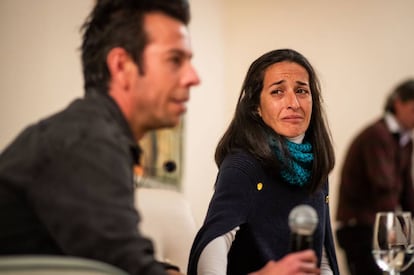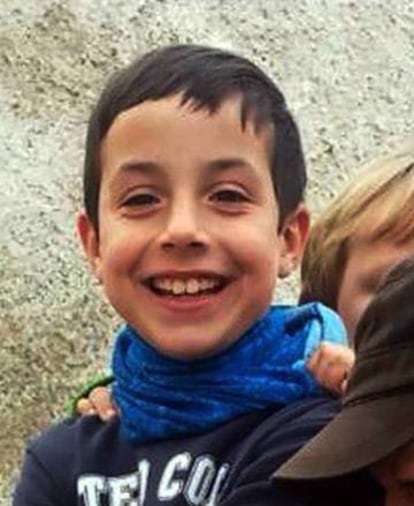Parents of murdered child Gabriel speak out ahead of jury trial in Spain
A year after the eight-year-old went missing in Almería, Patricia Ramírez and Ángel Cruz open up about their pain and their efforts to find justice for their son

The parents of Gabriel Cruz, an eight-year-old boy who was found dead in southern Spain a year ago following a long search, have spoken to the media ahead of the trial by jury that will put his alleged murderer on the stand.
Gabriel’s parents were separated and his father, Ángel Cruz, was living with his new girlfriend, Ana Julia Quezada, who was caught by police moving the child’s body in the trunk of her car 12 days after the search for the youngster began in Níjar, in Almería province.

In November, the self-confessed killer told the investigating judge how she buried the child and then pretended to search for him. Quezada claimed she acted in self-defense after the youngster attacked her with a hatchet. She told investigators that she hit the boy with the blunt part of the tool, then strangled him, stripped him of his clothes and buried the body.
The court investigation into the case ended on Wednesday, and a trial date will be announced shortly. The hearings will take place at the Almería High Court.
On Wednesday, Patricia Ramírez and Ángel Cruz said they will seek to add evidence to the trial regarding the death of another child who was in Quezada’s care. The incident, which took place in Burgos, northern Spain, in 1996, saw the four-year-old daughter of Quezada fall out of a window to her death. A subsequent investigation, however, found that it was an accident and a court investigation was shelved.
“The records of what happened in Burgos have a lot to do with our son’s case, regardless of whether it has exceeded the statute of limitations,” said the parents on Wednesday.
They also asked the media not to publish anything that could be used by the defense to file for a mistrial on the basis of undue influence on the jury. Ramírez and Cruz said they want an “unquestionable” conviction against Quezada. “We want two things: justice for Gabriel and to make sure that this woman doesn’t hurt anyone else.”

Gabriel’s mother said she has been unable to return to her old job. “I tried to restart my professional life, which is related to physical exercise and sports, in which I have to encourage people to do exercises via a microphone, but the public repercussion [of the case] has been so big that it’s proven impossible for me. I’ve been unable to go back to it,” she said. Ramírez has also had to move to a new home. “On the emotional and psychological front we still have the support of specialists who help us deal with the pain of his absence,” she explained.
Ángel Cruz has returned to work. “It helps avoid all the thoughts that assail me about what I could have done to prevent this. I needed to focus on my job to stop torturing myself,” he said, adding that he still gets feelings of guilt.
“I have occasionally contemplated suicide, but I know that you don’t leave when you decide to. I know that I have to live life in a dignified way for his sake, so he can be proud of his father,” he said.
For the first time, Gabriel’s mother used the term “murderer” to describe Ana Julia Quezada, a 44-year-old native of Dominican Republic who moved to Spain in her early twenties. Gabriel’s parents insisted on the need to “talk about the good that has come from thousands of people, and not about the evil from one single woman. We don’t want to be paralyzed by feelings of pain and revenge.”
Their lawyer will seek the maximum penalty available for these cases in the Spanish criminal system, prisión permanente revisable, or reviewable permanent prison, which allows judges to convict criminals to life with a possibility of review after a minimum fixed term in cases considered to be particularly heinous, such as assassinating a head of state, terrorist homicides, killing a minor under 16 years of age, and serial killings.
English version by Susana Urra.
Tu suscripción se está usando en otro dispositivo
¿Quieres añadir otro usuario a tu suscripción?
Si continúas leyendo en este dispositivo, no se podrá leer en el otro.
FlechaTu suscripción se está usando en otro dispositivo y solo puedes acceder a EL PAÍS desde un dispositivo a la vez.
Si quieres compartir tu cuenta, cambia tu suscripción a la modalidad Premium, así podrás añadir otro usuario. Cada uno accederá con su propia cuenta de email, lo que os permitirá personalizar vuestra experiencia en EL PAÍS.
¿Tienes una suscripción de empresa? Accede aquí para contratar más cuentas.
En el caso de no saber quién está usando tu cuenta, te recomendamos cambiar tu contraseña aquí.
Si decides continuar compartiendo tu cuenta, este mensaje se mostrará en tu dispositivo y en el de la otra persona que está usando tu cuenta de forma indefinida, afectando a tu experiencia de lectura. Puedes consultar aquí los términos y condiciones de la suscripción digital.









































